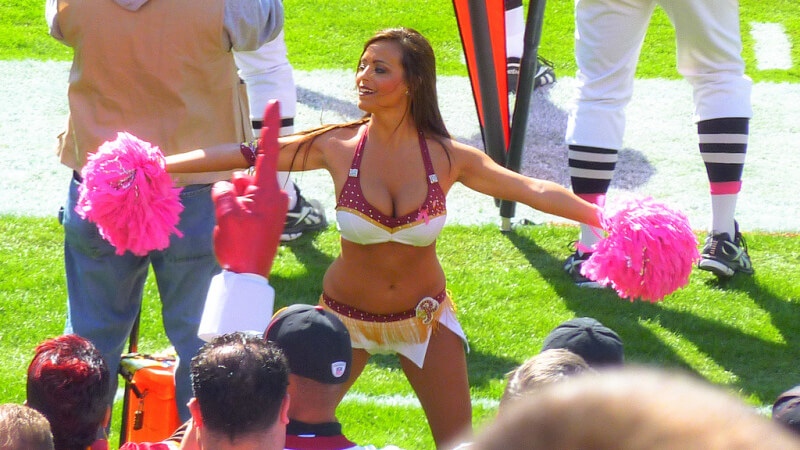
There are more important things to focus on in NFL football betting than injuries and recent scores. Like the cheerleaders. (Photo credit: Matthew Straubmuller / Foter / CC BY)
Millions of people make NFL spread picks against the NFL lines each week, and many of them think the same way.
“The Patriots are way better than the Bills, so they’ll win easily.”
“The Colts won by 28 last week, so they’re hot.”
“The Chargers beat the Browns, who beat the Dolphins, so the Chargers will beat the Dolphins.”
Or, to use your girlfriend’s logic, “The Broncos horsie looks way faster than the old Raiders guy.”
If it were that easy, everyone would be millionaires.
But there are so many different things you have to consider when making your weekly football predictions. There are also a lot of things that you need to make sure you don’t do when making your NFL spread picks.
With that said, here are 3 mistakes many NFL bettors make.
1. Betting against teams because they’re missing a star running back
Ezekiel Elliotts emergence might make Ravens, other teams rethink value of running backs https://t.co/77m0OnyH96 pic.twitter.com/tLw1y3NGYm
— Zesty NFL Ravens (@zesty_ravens) March 3, 2017
Next to quarterbacks and the occasional wide receiver, running backs are the best-known players in NFL football.
They’re also the most replaceable.
So much of the running game in the NFL is dependent on the offensive line and blocking schemes. Teams are spending less money and less high draft picks on the running back position.
In most cases, the backup running back can come close to matching the production of the injured starter. They might even exceed it, considering teams tend to elevate their level of play when missing one of their star players.
The Buccaneers’ running game actually improved a little when starter Doug Martin got hurt midway through the 2013 NFL season.
The oddsmakers factor injuries into the NFL point spreads, so you won’t be outsmarting anyone by betting against the team with the injured running back.
In fact, you might even benefit a bit from the public perception that the team missing its star running back won’t be able to move the ball on the ground. It’s quite likely that his backup won’t be much worse, his blockers will be more focused than usual to open holes for him, and you are catching an extra point or two of value on the point spread to boot.
2. Betting on or against teams because of last week’s outcome
Don’t get caught up in last week’s results while playing NFL #DFS. Recency bias can burn you https://t.co/3lVsjKus7m pic.twitter.com/IamJZx4guz
— FantasyWired (@Fantasy_Wired) September 19, 2016
Bettors are typically influenced by what they saw last.
That’s because of recency bias, which is also a pretty common mistake in the stock market. Essentially, recency bias is when bettors (or investors) base their decisions on the most recent results, expecting those results to continue, instead of projecting future potential.
If you’ve followed stocks or sports teams at all, you know that they inevitably go through both ups and downs. So just because they went up last week doesn’t mean they’re going to continue to go up this week. In fact, you could argue that it’s more likely that they’re going to come back down.
Here’s an example in the NFL.
The Ravens and Bengals might be fairly equal teams, but if the Ravens are coming off a dominating win and the Bengals off an embarrassing loss, most people will want to bet on the Ravens.
Oddsmakers know this, so they’ll shade the spreads accordingly. Instead of the Ravens being a 3-point favourite over Cincinnati, they might be favoured by 5 or 6 points based on their most recent performances.
Actually, it can pay off to be a contrarian in situations like this.
If the Bengals are coming off an embarrassing loss, they should be more motivated and focused to play well. There’s nothing like hearing how bad you are to get you fired up to prove people wrong.
Meanwhile, the Ravens might be “fat and happy”, a bit full of themselves and not as focused on the upcoming matchup. With football being so much about intensity and desire, you’ll want to have your money on the more desperate team with something to prove, not the team that has been reading its own headlines all week.
3. Betting on teams just because they pass for a lot of yards
In a loss, Drew Brees recorded 423 yards, on 28/42 passing with 4 TDs. #Saints pic.twitter.com/2urD06nsRv
— NFL Update (@MySportsUpdate) September 11, 2016
Just like chicks dig the long ball, we football fans dig the long bomb.
We’re dazzled by aerial attacks that light up the sky, rather than by running games that chew up 4 yards per play on the ground.
However, passing yards may be the most misleading statistic in football, if not all of sports.
Teams don’t typically set out to throw for 400 yards in a game. Tons of passing yards is usually a sign of playing from behind, when teams throw more because incompletions stop the clock. Teams that are in control of the game often hand the ball off more in the late going, looking to run out the clock.
In Super Bowl XLVIII, the Broncos outgained the Seahawks in passing yards, 280-206. The Seahawks crushed the Broncos, 43-8.
The staples of winning football teams are the less glamourous statistics: Running the ball, stopping the run, and winning the turnover battle. Those are the stats you should be paying the most attention to when making your NFL spread picks.


